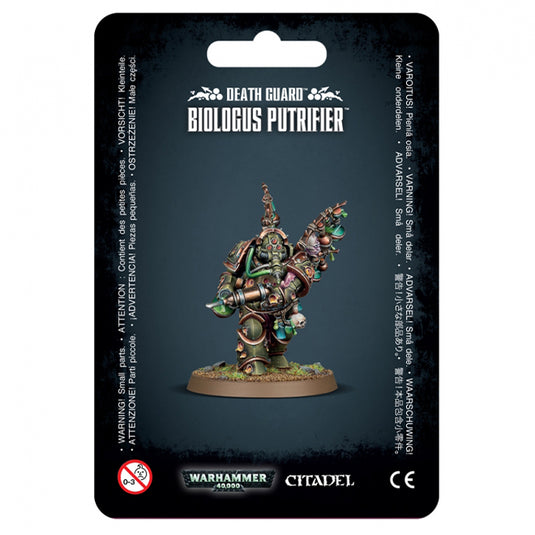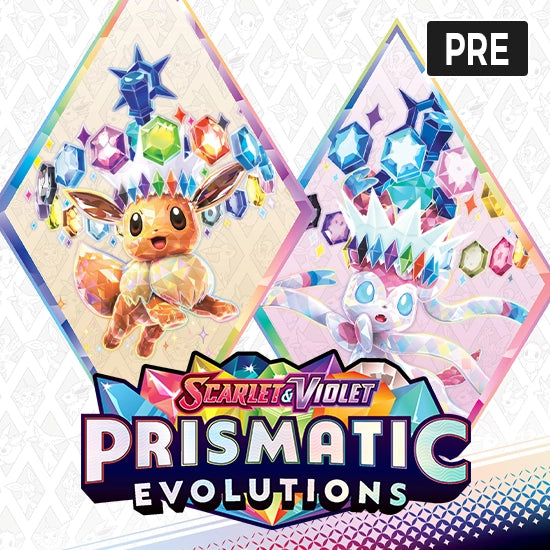Description
The great labour of the Death Guard is to spread Nurgle’s bounteous gift to every corner of realspace. The Biologus Putrifiers have a vital role to play in this process, for it is they who refine the batches of diseased slurry brewed by the Foul Blightspawn, and distil them to the utmost potency. From their backs dangle racks of blight grenades, churning with the latest strains of noxious plagues. With each volley of hurled ordnance, their epidemic spreads; injector pistols unleashing concentrated doses of foulness into their targets.
This multi-part plastic kit contains the components necessary to assemble a Biologus Putrifier. He’s clad in the usual corrupted, rusting armour of the Death Guard, with plenty of the Nurgle symbolism and sinister emerging tentacles you’d expect (as well as burn marks and melting panels, possibly due to the caustic potions he experiments with) – but the standout feature is the enormous rack of blight grenades that hangs from his back, covered in a dozen or more plague-filled explosive containers ripe for the picking. He wields an injector pistol, which he is posed in the act of reloading with a vial of some unpleasant concoction; a tentacle also grips a plague knife. Even the breathing apparatus on his helmet features a proboscis-like extrusion – all the better for sensing the results of his experiments.
This kit comes as 10 components, and is supplied with a Citadel 40mm Round base.
Frequently Asked Questions
What are miniatures used for in tabletop games?
Miniatures are small, detailed models used in tabletop games to represent characters, creatures, and scenery.
They enhance the visual experience and aid in gameplay by providing a physical representation of game
elements.
How do I paint my miniatures?
Painting miniatures involves several steps: priming the miniature with a base coat, applying base colors,
adding details with fine brushes, and finishing with a protective sealant. Many hobbyists use acrylic paints
and invest in quality brushes for the best results. You can pick some up from our Paints
Section
What materials are miniatures typically made from?
Miniatures are commonly made from plastic, resin, or metal. Each material has its own advantages; plastic is
lightweight and affordable, resin captures fine details well, and metal miniatures are durable and have a
classic feel.
How can I start collecting miniatures?
Start by choosing a game or genre that interests you. Purchase a starter set or a few miniatures to begin
with, and gradually expand your collection. Joining local gaming groups or online communities can provide
valuable advice and support.
Where can I buy miniatures?
Miniatures can be purchased from Here. As well as from Hobby shops
like our Gaming Centre, or at
Conventions, or Games Workshop
What are some tips for assembling miniatures?
Use a hobby knife or clippers to carefully remove pieces from sprues. Dry fit parts before gluing to ensure
proper alignment, and use a plastic or super glue appropriate for the material. Allow glued parts to fully
dry before handling. All of these can be found Here
Can miniatures be used in different games?
While some miniatures are specific to certain games, many can be used across different tabletop games and
RPGs, especially if they fit the theme or setting. Check the scale and style to ensure compatibility.
How should I store and transport my miniatures?
Store miniatures in a cool, dry place, ideally in a protective case with individual compartments to prevent
damage. When transporting, use foam trays or padded bags to cushion the miniatures and keep them secure.
Are there any beginner-friendly miniature painting tutorials?
Yes, there are many beginner-friendly tutorials available online. Websites, YouTube channels, and hobby blogs
often provide step-by-step guides and videos to help newcomers learn painting techniques and improve their
skills.






